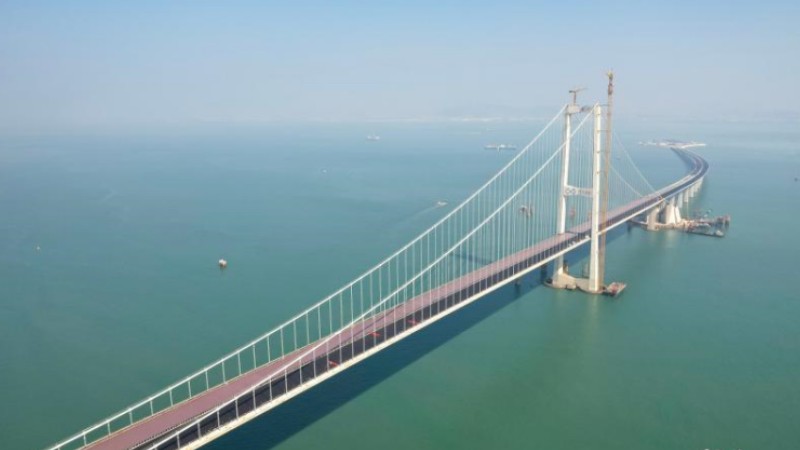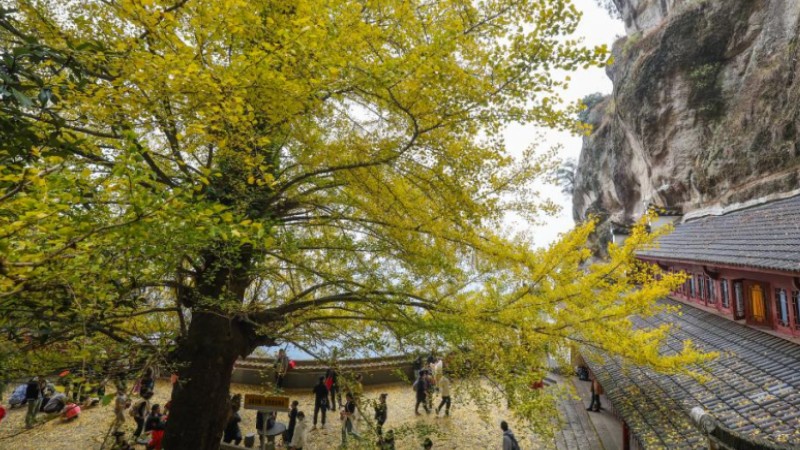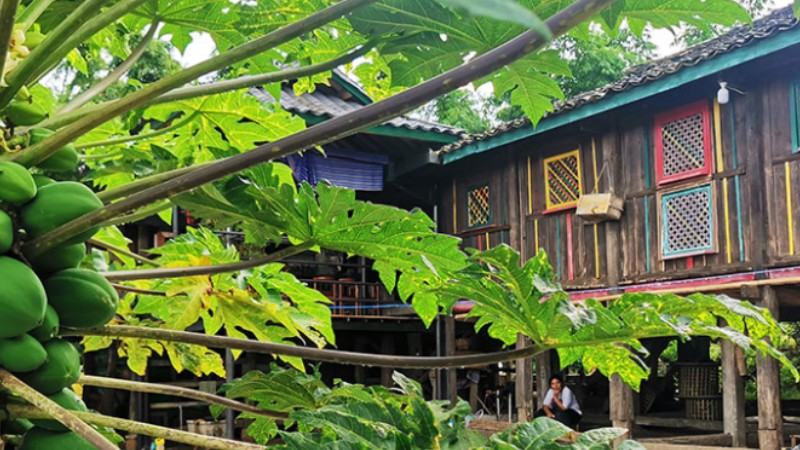David Crilly: Cultural exchange through the art of drama
Recently returned from China, Dr. David Crilly, the founder and artistic director of Cambridge Shakespeare Festival, radiates excitement in an interview with People’s Daily Online. He enthusiastically shares insights from his exchanges with esteemed theatrical Chinese institutions such as the Beijing People’s Art Theatre and Jiangsu Province Kun Opera Theatre in Nanjing. Crilly hopes to collaborate with talented Chinese actors and actresses, fostering valuable cultural exchanges through the medium of drama. Currently, he is engaged in talks on future collaborations with these Chinese theatres, and hopes to bring the Cambridge Shakespeare Festival to China once more, as well as invite Chinese theatre groups to perform in the UK.
A major cultural event spanning an impressive 36 years, the Cambridge Shakespeare Festival takes place every summer in the outdoor gardens of the colleges of the University of Cambridge. Over the course of eight weeks, well-known dramatists, as well as aspiring young actors and actresses put together the marvelous plays of Shakespeare, attracting audiences from all over the world. With a wealth of experience in the realm of performing arts, Crilly has brought audiences countless exceptional productions. For him, “play is at the heart of [our] imagination, opening the door for us to think in different ways, forming connections between people.”

Dr. David Crilly with a poster of the 2023 Cambridge Shakespeare Festival (Photo/Jedrek Koh)
Hosting the Cambridge Shakespeare Festival
Crilly explained that one of the really positive things about the festival is that it offers audiences an experience of coming to a traditional open-air theatre. All actors and actresses wear full-period costumes, and the performances are accompanied by Elizabethan music, taking audiences back to Shakespeare’s days. Every year, the festival showcases the marvelous works of the Bard to audiences from all over the world. Crilly mentioned that many Chinese summer school students have come to see the productions of “A Midsummer Night’s Dream” and “The Tempest” this summer.
The Cambridge Shakespeare Festival also includes the Cambridge Academy of Dramatic Art, which focuses on the education and training of young people in the field of performing arts. Crilly highly encourages young people to read and perform Shakespeare’s plays. “Shakespeare is at the core of Western culture, drama and the English language. From a linguistic point of view, Shakespeare’s language is very structured and has rhythm and patterns that are fundamental to the English language. Working with Shakespeare will enable students to get a greater grasp of the natural flow of English. Shakespeare’s plays are all about developing imagination, developing an individual mode of expression through the characters of the play. Pretending to be someone else enables us all to experience a different kind of life,” Crilly said.
Crilly believes that one of the reasons that Shakespeare is such a powerful force in Western culture is because even though the stories are 450 years old, we recognize the people in the plays. “Shakespeare’s characters are all human beings. We know people who have been in love. We know people who are treacherous. We know people who are envious. We know people who are silly, comical and buffoonish,” Crilly explained.
Bringing Shakespeare’s masterpieces to the stages of Fuzhou
In 2019, Crilly and his company were invited to take part in the Tang Xianzu International Drama Festival in Fuzhou, and brought vivid performances of Hamlet and Romeo and Juliet to the local stages. Crilly also saw short extracts of Kun Opera at Yulong Wanshou Palace and a large-scale production of the “Peony Pavilion”, a masterpiece by the Ming dynasty playwright Tang Xianzu. He recalled that “the elegance and grace of the performances far exceeded my expectation; they were highly praised by myself, as well as the English actors and actresses. Like Shakespeare, Tang Xianzu plays a leading role in Chinese culture. His works have heavily influenced Chinese modern drama, being central to Chinese drama,” Crilly remarked.
Recalling the experience of performing “Hamlet” at Tang Xianzu Grand Theatre, Crilly said that “it was amazing but quite challenging.” For Crilly, one of the positive things about this trip to Fuzhou was that the English actors and actresses were performing in different settings and had to think of different ways of presenting the play. He remembers the performance at Sanweng Garden in Fuzhou as being the most instructive. “The audience did not speak any English at all, so we had to work out how to communicate with them. It was our experience of watching extracts from the Kun Opera, which is full of vivid gestures, that gave us an idea; I told the actors to really exaggerate the physical gestures and the meaning of their lines, and the characterization would come across that way. So, that performance was completely different to anything we had done before,” he explained. Whether it was performing Shakespeare’s plays, or watching Kun Opera performances, Crilly considered these experiences in Fuzhou as very informative and a huge amount of fun, as well as a great opportunity to cross-fertilize cultures.

Dr. David Crilly in Cambridge (Photo/Jedrek Koh)
Fostering new China-UK collaborations in the realm of drama
In June this year, Crilly travelled to China again and visited several leading theatres. At the Beijing People’s Art Theatre, he met and shared with young aspiring Chinese actors and actresses Shakespeare’s masterpieces and the history behind them, and also engaged in lively discussions on English and Chinese drama, performing arts and education with them. He also visited the Theatre Museum of Beijing People’s Art Theatre with the introduction of well-known actor Yu Zhen and watched the play “I Love Peach Blossom”. In Nanjing, Crilly visited Nanjing University and discussed Kun Opera performance with the influential Kun Opera artist Shi Xiaming, following it with a visit to the Jiangsu Province Kun Opera Theatre and a Kun Opera performance there. He said that “the stylized and historical approach of Kun Opera seemed to have heavily influenced Chinese modern drama. The two performances, which I saw at Beijing People’s Art Theatre and Jiangsu Province Kun Opera Theatre, really encapsulated approaches of Chinese drama at the moment.”
Crilly looks forward to fostering collaborations in the field of Chinese performative arts in the future. He has spoken with the Director of Beijing People’s Art Theatre, Feng Yuanzheng, and discussed the possibility of taking a production out to perform at the theatre, and for People’s Art Theatre to bring a production over to the UK during Cambridge Shakespeare Festival. He said that many of the themes of the dramas in China have echoes of the plays that were performed in the Cambridge Shakespeare Festival, so very positive collaborations could be forged going forward.

Dr. David Crilly at the Palace Museum in Beijing, China (photo/April Zhao)
Recently, Crilly also participated in the establishment of the China-UK Performing Arts Association, hoping to further promote exchanges between artists and scholars from China and Britain. He will work closely with Cam Rivers Publishing in the UK to edit and publish a series of bilingual Chinese-English books on theatrical direction and performance based on classic plays by Shakespeare and Tang Xianzu. The series will hopefully prove equally useful for drama teachers and students in both China and Britain as reference materials. He believes it will help them to learn about dramas from different cultural backgrounds. “The benefit of cross-cultural exchange in performing arts is a chemical one. Cultural exchange offers the addition of a whole range of different colors on a palette. We can see what the other has to offer, then take and select things that will enable us to do things in a slightly different, more informed and more universal way,” he remarked.
Photos
Related Stories
- Immersive live drama injects vitality into tourism
- China to host dual theater festivals in November
- Chinese dance drama "Mulan" staged in Boston
- Chinese production of Shakespeare's drama to stage in Beijing
- "Chinese + Theatre" builds bridge of China-US people-to-people exchange
- Drama "Beijing Fayuan Temple" to be staged in Beijing
- Telling stories with light and shadows: Chinese shadow puppetry
- Hit show educating public on rule of law
- Chinese version of Israeli play Ghetto staged in Beijing
- Romantic drama "My Love" tops China's box office
Copyright © 2023 People's Daily Online. All Rights Reserved.









